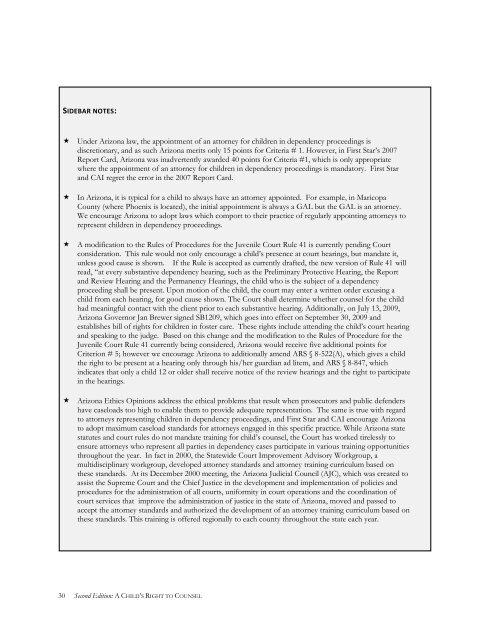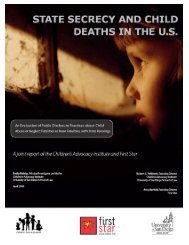A CHILD'S RIGHT TO COUNSEL - Children's Advocacy Institute
A CHILD'S RIGHT TO COUNSEL - Children's Advocacy Institute
A CHILD'S RIGHT TO COUNSEL - Children's Advocacy Institute
- No tags were found...
You also want an ePaper? Increase the reach of your titles
YUMPU automatically turns print PDFs into web optimized ePapers that Google loves.
SIDEBAR NOTES: Under Arizona law, the appointment of an attorney for children in dependency proceedings isdiscretionary, and as such Arizona merits only 15 points for Criteria # 1. However, in First Star‘s 2007Report Card, Arizona was inadvertently awarded 40 points for Criteria #1, which is only appropriatewhere the appointment of an attorney for children in dependency proceedings is mandatory. First Starand CAI regret the error in the 2007 Report Card. In Arizona, it is typical for a child to always have an attorney appointed. For example, in MaricopaCounty (where Phoenix is located), the initial appointment is always a GAL but the GAL is an attorney.We encourage Arizona to adopt laws which comport to their practice of regularly appointing attorneys torepresent children in dependency proceedings. A modification to the Rules of Procedures for the Juvenile Court Rule 41 is currently pending Courtconsideration. This rule would not only encourage a child‘s presence at court hearings, but mandate it,unless good cause is shown. If the Rule is accepted as currently drafted, the new version of Rule 41 willread, ―at every substantive dependency hearing, such as the Preliminary Protective Hearing, the Reportand Review Hearing and the Permanency Hearings, the child who is the subject of a dependencyproceeding shall be present. Upon motion of the child, the court may enter a written order excusing achild from each hearing, for good cause shown. The Court shall determine whether counsel for the childhad meaningful contact with the client prior to each substantive hearing. Additionally, on July 13, 2009,Arizona Governor Jan Brewer signed SB1209, which goes into effect on September 30, 2009 andestablishes bill of rights for children in foster care. These rights include attending the child‘s court hearingand speaking to the judge. Based on this change and the modification to the Rules of Procedure for theJuvenile Court Rule 41 currently being considered, Arizona would receive five additional points forCriterion # 5; however we encourage Arizona to additionally amend ARS § 8-522(A), which gives a childthe right to be present at a hearing only through his/her guardian ad litem, and ARS § 8-847, whichindicates that only a child 12 or older shall receive notice of the review hearings and the right to participatein the hearings. Arizona Ethics Opinions address the ethical problems that result when prosecutors and public defendershave caseloads too high to enable them to provide adequate representation. The same is true with regardto attorneys representing children in dependency proceedings, and First Star and CAI encourage Arizonato adopt maximum caseload standards for attorneys engaged in this specific practice. While Arizona statestatutes and court rules do not mandate training for child‘s counsel, the Court has worked tirelessly toensure attorneys who represent all parties in dependency cases participate in various training opportunitiesthroughout the year. In fact in 2000, the Statewide Court Improvement Advisory Workgroup, amultidisciplinary workgroup, developed attorney standards and attorney training curriculum based onthese standards. At its December 2000 meeting, the Arizona Judicial Council (AJC), which was created toassist the Supreme Court and the Chief Justice in the development and implementation of policies andprocedures for the administration of all courts, uniformity in court operations and the coordination ofcourt services that improve the administration of justice in the state of Arizona, moved and passed toaccept the attorney standards and authorized the development of an attorney training curriculum based onthese standards. This training is offered regionally to each county throughout the state each year.30 Second Edition: A CHILD‘S <strong>RIGHT</strong> <strong>TO</strong> <strong>COUNSEL</strong>






